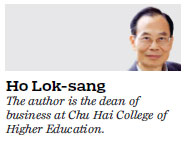Arguments about HK's 'democracy deficit' are shaky
Updated: 2018-12-11 06:08
(HK Edition)
|
|||||||
Ho Lok-sang explains why he disagrees with suggestions the city is facing a 'democracy deficit', noting that 'full democracy' may
still result in rule by the rich and powerful
Court of Final Appeal judge Kemal Bokhary last week joined Senior Counsel Gladys Li and Lord Mance, former deputy president of the United Kingdom Supreme Court at a forum on the rule of law organized by the Project Citizen Foundation, to urge a reboot of the democracy movement in Hong Kong, warning against a delay in democratic development. He said a "democracy deficit" is the biggest issue facing Hong Kong. In particular, he is disappointed with the lack of progress in electing the chief executive and all Legislative Council members by the popular vote.

While I agree that electing the CE and all LegCo members by the popular vote may be nice to have, other things being equal, I disagree that short of this there will be a "democracy deficit". To me, democracy must serve the people. We need to be open minded if we want to look for a system to select the best people to serve Hong Kong. I have learnt that a "full democracy" in the sense of one-man-one-vote elections for officials in key positions of power may still be tainted by power abuses and corruption. A "full democracy" may still boil down to rule by the rich and the powerful. As a result, the needs of the man-in-the-street may still be ignored. Such a state is a mere "formal democracy" and not really a "substantive democracy". A new book by Benjamin Page and Martin Gillen concluded that in democratic United States, "the government consistently ignores the needs of its citizens, paying attention instead to donors and organized interests. Real issues are held hostage to demagoguery, partisanship beats practicality, and trust in government withers along with the social safety net." In Democracy in America?: What Has Gone Wrong and What We Can Do About It, published last year, they presented evidence showing how, notwithstanding its democratic facade, the US government - regardless of which party is elected, continues to "exacerbate inequality, enriching corporations and the wealthy while leaving ordinary citizens to fend for themselves".
The irony is that many in Hong Kong are pursuing just the facade of democracy instead of its substance, and some are prepared to make a huge sacrifice for it, and even sacrificing other Hong Kong people's interests.
Lord Mance was concerned about the Standing Committee of the National People's Congress interpreting the Basic Law. He says Hong Kong adheres to the common law tradition, and common law ensures that the state cannot violate the rights of citizens. He is worried that the NPCSC sides with the state and could infringe the basic rights of citizens. Quite apart from the fact that NPCSC does legally have the right to interpret the Basic Law, the NPCSC actually is obliged to act according to the basic principle of the Communist Party of China, which is in short to serve the people. Under the common law, the presiding judge similarly has to follow the principles of the common law in reaching his or her rulings. On the mainland, even though the judiciary is expected to "follow the Party", no Party member can act arbitrarily as if he was above the law. Although those who are used to the language used in common law will find "following the Party" alien to the rule of law, the differences are actually more apparent than real. It must not be forgotten that the Party's enterprise is always to represent "the requirements for developing China's advanced productive forces, the orientation of China's advanced culture, and the fundamental interests of the overwhelming majority of the Chinese people". This principle of "Three Represents" was ratified by the CPC at the sixteenth Party congress in 2002 and enshrined in the country's Constitution.
Bokhary says whatever you manage to do for the rule of law ahead of full democracy must never be used as justification or an excuse for any delay whatsoever in democratic development. This was applauded by Civic Party Chairman Alan Leong Kah-kit as implying that without "full democracy" the rule of law cannot last. Such a conclusion to me is more like "reached" by a leap of faith than by logic, for "more democratic" US has always ranked below "less democratic" Hong Kong in the Rule of Law Index of the World Justice Project.
Bokhary says NPCSC interpretation of the Basic Law undermines the rule of law in Hong Kong. This would be true if evidence can be found that NPCSC interpretation was arbitrary or motivated by the personal interests of some powerful individuals. But no one can argue that this has ever been the case. To some critics since the NPCSC interpretation on Nov 7, 2016 effectively barred two elected politicians, Leung Chung-hang and Yau Wai-ching, after their controversial actions during their swearing-in ceremony in October, that interpretation "is curtailing Hong Kong's judicial independence". But the "interpretation" not only is in line with the spirit of the Oaths and Declarations Ordinance, a local law, also it is also common sense that a legally binding oath should be made solemnly and respectfully. If the NPCSC has the legal right to interpret the Basic Law, and if no instance can be found that the interpretation is arbitrary or serves someone's private interests, any concerns about curtailing Hong Kong's rule of law are unfounded.
(HK Edition 12/11/2018 page9)